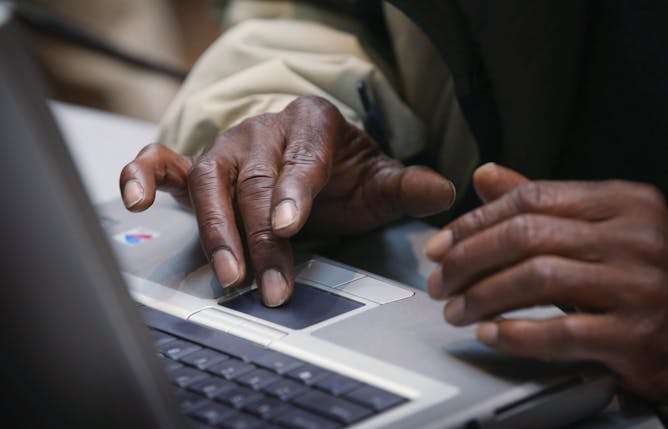
A man fills out an online application during a job fair hosted by the city of Chicago in July 2012. The fair offered computer access to people who do not have internet access.
Scott Olson/Getty Images
Tamra Burns Loeb, UCLA School of Medicine; Arleen F. Brown, UCLA School of Medicine; Paris "AJ" Adkins-Jackson, Harvard University
Early numbers show that people from racial and ethnic minorities have lower vaccination rates. Lack of internet access could be a reason.
|
Economy + Business
|
-
Alexander Carter, University of Tennessee
Advertisers forked over $5.5 million for a mere 30 seconds of air time during the Super Bowl. Here's Twitter's verdict on which brands got social media bang for their bucks.
|
|
Health
|
-
Cate Varney, University of Virginia
Americans with excess weight and obesity have been hit hard by COVID-19. Now there is reason to believe they may not get the same protection from the vaccines.
|
|
Politics + Society
|
-
Joshua F.J. Inwood, Penn State; Anna Livia Brand, University of California, Berkeley
Geographers are documenting slave-built infrastructure, from railroads to ports, in use today. Such work could influence the reparations debate by showing how slavery still props up the US economy.
-
Michael Humphrey, Colorado State University
The 45th president of the United States used a specific technique to tell different versions of the very same story, of a nation under threat and a man working to save it.
-
Mark Canada, Indiana University
Benjamin Franklin spoke and wrote in ways that, if taken up now, could begin to erode the polarization of the current era.
|
|
Ethics + Religion
|
-
Anders C. Hardig, American University School of International Service; Tazreena Sajjad, American University School of International Service
The roots of Buddhist nationalism in Myanmar go back to colonial days. Those behind the military coup are seeking to harness it to legitimize the seizure of power.
|
|
Environment + Energy
|
-
Philip H. Howard, Michigan State University; Mary Hendrickson, University of Missouri-Columbia
Food production in the US is heavily concentrated in the hands of a small number of large agribusiness companies. That's been good for shareholders, but not for consumers.
|
|
Education
|
-
Karen Sieber, University of Maine
After spending years examining the violent Red Summer of 1919, historian Karen Sieber discovered a previously hidden incident on the campus where she now works.
|
|
Science + Technology
|
-
Bill Sullivan, Indiana University
Microbes can alter the minds of mouse mothers and disrupt their natural instinct to nurture their young.
-
Clive Wynne, Arizona State University
Dogs' barks say a lot about how they're feeling.
|
|
Trending on Site
|
-
Alvaro Jarrin, College of the Holy Cross
Over the past year, the singer has carefully constructed a visage that has made him nearly unrecognizable.
-
Leo Rodriguez, Grinnell College; Shanshan Rodriguez, Grinnell College
If you are a sci-fi junkie you've probably wondered what would happen if you were unlucky enough to fall into a black hole. How well you'd fare all depends on the type of black hole.
-
Varghese Mathai, University of Massachusetts Amherst
Keeping windows open while driving at a moderate speed can increase airflow inside the cabin of the car, but which ones should you keep open?
|
|